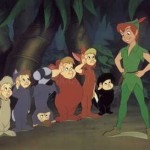 Disney taught us that, “when you wish upon a star, your dreams come true.” Unfortunately, if your dream is to have both of your parents live to see you succeed, you’re sheer out of luck. In fact, of Disney’s forty full-length animated features from 1937 until 2000, I know of only one where the protagonist’s parents remain alive for the entire film.* Then there’s the fact that just about every super-powered hero is an orphan. If this isn’t bad enough, one or both of the hero’s adoptive parents often dies too! Superman lost his adoptive dad, Spider-Man lost his uncle, and Luke Skywalker lost both his aunt and uncle. With the Amazing Spider-Man movie set for release this summer, and that movie actually exploring the mysterious back-story about Peter Parker’s real parents, I thought it would be a good time to delve into the topic of why so many of our heroes—both super and animated—are orphans, and what the message means for all of us.
Disney taught us that, “when you wish upon a star, your dreams come true.” Unfortunately, if your dream is to have both of your parents live to see you succeed, you’re sheer out of luck. In fact, of Disney’s forty full-length animated features from 1937 until 2000, I know of only one where the protagonist’s parents remain alive for the entire film.* Then there’s the fact that just about every super-powered hero is an orphan. If this isn’t bad enough, one or both of the hero’s adoptive parents often dies too! Superman lost his adoptive dad, Spider-Man lost his uncle, and Luke Skywalker lost both his aunt and uncle. With the Amazing Spider-Man movie set for release this summer, and that movie actually exploring the mysterious back-story about Peter Parker’s real parents, I thought it would be a good time to delve into the topic of why so many of our heroes—both super and animated—are orphans, and what the message means for all of us.
 In a New York Press article from August, 2011, film producer and director Tommy Pallotta, said, “I am a fan of audience participation, but I also think audiences like to be told a story. There’s this thing video game designers call a ‘golden path’—there’s a definite way that the majority of people are going to experience the game, and the designers plot that. A lot of the interactivity in a video game is really just the illusion of interactivity. It’s about engaging the audience and giving at least the feeling of volition. But as the artist you have the sense that you are, in some way, controlling it, blending the craft of storytelling with the illusion of agency.” In other words, in a game you think you are controlling the action, but really it’s already been pre-programmed. Kind of like what we think of as destiny. In fact, maybe that’s exactly what destiny is: the path we are meant to take in order to have the most fulfilling experience.
In a New York Press article from August, 2011, film producer and director Tommy Pallotta, said, “I am a fan of audience participation, but I also think audiences like to be told a story. There’s this thing video game designers call a ‘golden path’—there’s a definite way that the majority of people are going to experience the game, and the designers plot that. A lot of the interactivity in a video game is really just the illusion of interactivity. It’s about engaging the audience and giving at least the feeling of volition. But as the artist you have the sense that you are, in some way, controlling it, blending the craft of storytelling with the illusion of agency.” In other words, in a game you think you are controlling the action, but really it’s already been pre-programmed. Kind of like what we think of as destiny. In fact, maybe that’s exactly what destiny is: the path we are meant to take in order to have the most fulfilling experience.
 By now you have no doubt heard that according to astronomers and anthropologists, December 21, 2012 correlates to the “end” of the Mayan calendar. And, despite having repeatedly heard about this for many, many years now, it is also very probable that you still have no idea exactly what this means. The reason is because it’s very complicated. To even begin to understand it you need to look to the Mayan myths of the Sacred Tree and understand their incredibly complex Long Count calendar of tuns, k’atuns, and b’aktuns as well as their concepts of the Great Cycle, the Great Great Cycle, and cycles within cycles. You’d also need to understand astronomical occurrences involving the precession of the equinoxes and the conjunction of the sun at the intersection of the plane of the ecliptic and the Milky Way. You can do all that, or, you can simply read my interpretation of this summer’s Green Lantern movie, which shares the same message as the Mayan mythology.
By now you have no doubt heard that according to astronomers and anthropologists, December 21, 2012 correlates to the “end” of the Mayan calendar. And, despite having repeatedly heard about this for many, many years now, it is also very probable that you still have no idea exactly what this means. The reason is because it’s very complicated. To even begin to understand it you need to look to the Mayan myths of the Sacred Tree and understand their incredibly complex Long Count calendar of tuns, k’atuns, and b’aktuns as well as their concepts of the Great Cycle, the Great Great Cycle, and cycles within cycles. You’d also need to understand astronomical occurrences involving the precession of the equinoxes and the conjunction of the sun at the intersection of the plane of the ecliptic and the Milky Way. You can do all that, or, you can simply read my interpretation of this summer’s Green Lantern movie, which shares the same message as the Mayan mythology.
 As mentioned in last quarter’s column, there have been a lot of “life-as-illusion” themed movies coming out lately. While I suspect that the success of Avatar and Lost are partly responsible for this trend, I think people’s fascination with 2012, drastic world changes, and a surge in our search for meaning are also fueling the recent string of films about alternate realities and simulated worlds. When airplanes are crashing into buildings, cities are submerged underwater, the Middle East is revolting, and the world economy is collapsing, real life almost seems more fantastical than our dreams. Jon Stewart summed it up perfectly at the 2008 Academy Awards: “Normally, when you see a black man or a woman president, an asteroid is about to hit the Statue of Liberty.” Yes, we are now officially living in the future, and we all know what kind of stuff happens in the future—exactly the kind of stuff that’s happening right now. But at least, thanks to Hollywood, we’ve been warned. And Hollywood’s heads up may even go much deeper than prophesies of events to come. They may help explain the reality we all find ourselves in.
As mentioned in last quarter’s column, there have been a lot of “life-as-illusion” themed movies coming out lately. While I suspect that the success of Avatar and Lost are partly responsible for this trend, I think people’s fascination with 2012, drastic world changes, and a surge in our search for meaning are also fueling the recent string of films about alternate realities and simulated worlds. When airplanes are crashing into buildings, cities are submerged underwater, the Middle East is revolting, and the world economy is collapsing, real life almost seems more fantastical than our dreams. Jon Stewart summed it up perfectly at the 2008 Academy Awards: “Normally, when you see a black man or a woman president, an asteroid is about to hit the Statue of Liberty.” Yes, we are now officially living in the future, and we all know what kind of stuff happens in the future—exactly the kind of stuff that’s happening right now. But at least, thanks to Hollywood, we’ve been warned. And Hollywood’s heads up may even go much deeper than prophesies of events to come. They may help explain the reality we all find ourselves in.
 There have been a lot of “life-as-illusion” themed movies coming out lately. We’ve had Avatar, Inception, and TRON: Legacy, and this month alone there’s The Adjustment Bureau, Limitless, Sucker Punch and Source Code. All these films share themes of alternate realities, questions about what is reality, and insight into powers that might be manipulating the reality we live in. While I hope to discuss the most recent batch of these films in an upcoming column, for now I’d like to bring up one that slipped past the radar of many moviegoers. This film actually gave me goose bumps when it revealed an angle that I’ve only recently adopted, and have never before seen in any other movie. That film is Disney’s Tangled.
There have been a lot of “life-as-illusion” themed movies coming out lately. We’ve had Avatar, Inception, and TRON: Legacy, and this month alone there’s The Adjustment Bureau, Limitless, Sucker Punch and Source Code. All these films share themes of alternate realities, questions about what is reality, and insight into powers that might be manipulating the reality we live in. While I hope to discuss the most recent batch of these films in an upcoming column, for now I’d like to bring up one that slipped past the radar of many moviegoers. This film actually gave me goose bumps when it revealed an angle that I’ve only recently adopted, and have never before seen in any other movie. That film is Disney’s Tangled.
 Lost is dead. Long live Lost. And so it ends, in much the same way it began—with a close-up of Jack’s eye, staring straight up past the tall stalks of bamboo that circled the sky above. This time however, that eye would close, and with it, our six-season journey that took us right back to where we started—with questions about a mysterious show that seemed to parallel the mysteries of life. For some, the journey was far more compelling than the destination. For others, it was the perfect resolution and they can walk away feeling fulfilled. Whatever you thought about the conclusion, the one thing most viewers can agree on is that the show challenged us to think in ways we might not have otherwise. In short, Lost was a real trip. And what a long, strange trip it’s been.
Lost is dead. Long live Lost. And so it ends, in much the same way it began—with a close-up of Jack’s eye, staring straight up past the tall stalks of bamboo that circled the sky above. This time however, that eye would close, and with it, our six-season journey that took us right back to where we started—with questions about a mysterious show that seemed to parallel the mysteries of life. For some, the journey was far more compelling than the destination. For others, it was the perfect resolution and they can walk away feeling fulfilled. Whatever you thought about the conclusion, the one thing most viewers can agree on is that the show challenged us to think in ways we might not have otherwise. In short, Lost was a real trip. And what a long, strange trip it’s been.
 In the penultimate episode of Lost, “What They Died For,” Jacob tells the surviving Losties why he chose them as candidates: “I chose you because you were all alone. You were all looking for something that you couldn’t find out there. I chose you because you needed this place as much as it needed you.” This explanation really resonated with me, on one hand because it provided a mythologically sound answer to the main question I’ve always had about Lost: why do all these characters have major issues? And having that answer provided the other reason I really liked the explanation: I immediately understood that while Jacob was addressing the remaining candidates, he was really speaking to us.
In the penultimate episode of Lost, “What They Died For,” Jacob tells the surviving Losties why he chose them as candidates: “I chose you because you were all alone. You were all looking for something that you couldn’t find out there. I chose you because you needed this place as much as it needed you.” This explanation really resonated with me, on one hand because it provided a mythologically sound answer to the main question I’ve always had about Lost: why do all these characters have major issues? And having that answer provided the other reason I really liked the explanation: I immediately understood that while Jacob was addressing the remaining candidates, he was really speaking to us.
 In “Across the Sea,” Lost finally gives us the origins story for Jacob and the Man In Black. The episode was pure, 100% mythology. Those who watched the episode based on the surface story alone were probably disappointed. Let’s face it, taken literally, myths are silly: talking snakes, little boys defeating giants, jealous gods, immaculate conceptions, mortals with superpowers, a sword stuck in a stone, the Force, Never Never Land, Wonderland, Oz, the Matrix, the Island. On the surface, all myths seem like children’s stories. It’s only when we dig deeper that we find the truth worthy of a wise old soul—a soul that knows where it really came from.
In “Across the Sea,” Lost finally gives us the origins story for Jacob and the Man In Black. The episode was pure, 100% mythology. Those who watched the episode based on the surface story alone were probably disappointed. Let’s face it, taken literally, myths are silly: talking snakes, little boys defeating giants, jealous gods, immaculate conceptions, mortals with superpowers, a sword stuck in a stone, the Force, Never Never Land, Wonderland, Oz, the Matrix, the Island. On the surface, all myths seem like children’s stories. It’s only when we dig deeper that we find the truth worthy of a wise old soul—a soul that knows where it really came from.
 Wanna know why the Man In Black is really trapped on the island? It’s not because he’s malevolence, evil, or darkness, and it’s not because Jacob wouldn’t let him leave. It’s because he hasn’t overcome his issues. And what are his issues? Up to now, all we know is that he seems to be terribly frightened of adolescent boys. Hopefully, we’ll get a better answer next week, but as ridiculous as this might sound, I actually think there may be something to it.
Wanna know why the Man In Black is really trapped on the island? It’s not because he’s malevolence, evil, or darkness, and it’s not because Jacob wouldn’t let him leave. It’s because he hasn’t overcome his issues. And what are his issues? Up to now, all we know is that he seems to be terribly frightened of adolescent boys. Hopefully, we’ll get a better answer next week, but as ridiculous as this might sound, I actually think there may be something to it.
 In Lost’s “The Last Recruit,” the Man In Black refers to John Locke as a “sucker” for believing in fate. As he points out, Locke pursued this belief until it got him killed so perhaps MIB has a point. Despite his compelling argument, Jack takes a leap of faith towards the exact same conclusion as his former nemesis. So does this make Jack—the last recruit himself—a sucker too? My short answer is yes, but, what if this isn’t necessarily a bad thing?
In Lost’s “The Last Recruit,” the Man In Black refers to John Locke as a “sucker” for believing in fate. As he points out, Locke pursued this belief until it got him killed so perhaps MIB has a point. Despite his compelling argument, Jack takes a leap of faith towards the exact same conclusion as his former nemesis. So does this make Jack—the last recruit himself—a sucker too? My short answer is yes, but, what if this isn’t necessarily a bad thing?
 Disney taught us that, “when you wish upon a star, your dreams come true.” Unfortunately, if your dream is to have both of your parents live to see you succeed, you’re sheer out of luck. In fact, of Disney’s forty full-length animated features from 1937 until 2000, I know of only one where the protagonist’s parents remain alive for the entire film.* Then there’s the fact that just about every super-powered hero is an orphan. If this isn’t bad enough, one or both of the hero’s adoptive parents often dies too! Superman lost his adoptive dad, Spider-Man lost his uncle, and Luke Skywalker lost both his aunt and uncle. With the Amazing Spider-Man movie set for release this summer, and that movie actually exploring the mysterious back-story about Peter Parker’s real parents, I thought it would be a good time to delve into the topic of why so many of our heroes—both super and animated—are orphans, and what the message means for all of us.
Disney taught us that, “when you wish upon a star, your dreams come true.” Unfortunately, if your dream is to have both of your parents live to see you succeed, you’re sheer out of luck. In fact, of Disney’s forty full-length animated features from 1937 until 2000, I know of only one where the protagonist’s parents remain alive for the entire film.* Then there’s the fact that just about every super-powered hero is an orphan. If this isn’t bad enough, one or both of the hero’s adoptive parents often dies too! Superman lost his adoptive dad, Spider-Man lost his uncle, and Luke Skywalker lost both his aunt and uncle. With the Amazing Spider-Man movie set for release this summer, and that movie actually exploring the mysterious back-story about Peter Parker’s real parents, I thought it would be a good time to delve into the topic of why so many of our heroes—both super and animated—are orphans, and what the message means for all of us.









